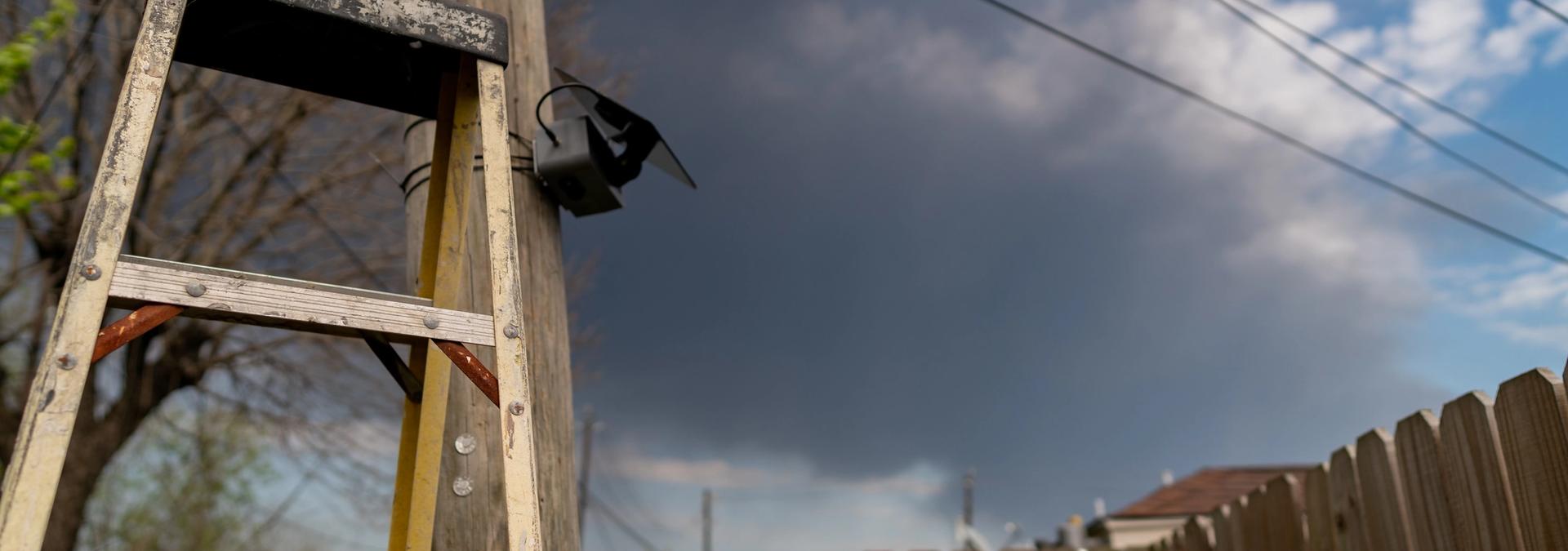
Black communities need clean air to breathe
An air monitor installed and owned by Pleasantville residents helps them know what they are breathing.
The pleas of George Floyd to Minneapolis police echoed the pleas of Eric Garner in New York City in 2014: “I can’t breathe.” It’s not just police brutality. Black communities have been saying for decades that we can’t breathe for another reason, as well — for having to live with a disproportionate burden of air pollution and other environmental injustices that lead to higher rates of lung and heart disease, even cancer.
Now, we are the communities being hit hardest by COVID-19, a respiratory disease attacking our lungs.
Breathing air that is safe, regardless of the color of our skin or our ZIP code, is a right. And the crisis of disparity shown by the coronavirus pandemic after decades of systemic racism makes it painfully clear that that right just isn’t being protected. This month, as the Environmental Protection Agency (EPA) decides whether to adopt a stronger standard for one kind of air pollution that could save more than 10,000 lives a year, we have the chance to tell them that we can’t breathe.
We have to because the EPA isn’t working for communities like Floyd’s — and like mine. In fact, President Donald Trump and his EPA’s radical environmental deregulatory agenda is a racist agenda. The EPA is working overtime to deregulate industries in ways that increase air pollution, harming communities of color and low-income communities where COVID-19 is disproportionately killing black people, Indigenous people and other people of color.
In 2005, Hurricane Katrina hit my family’s home in New Orleans, forever changing our lives. The storm forced us — and thousands of others — to evacuate to Houston and ultimately made us recognize the dire impact climate change is having on our safety, security, health, and well-being. We understand, on a deeply personal level, that the climate crisis stops for no one.
Eventually, we made the decision to remain in Houston, and I made it my mission to fight for the health and environment of our adopted hometown. The trauma of that experience led me to focus my career on advocating on behalf of those whose voices need to be uplifted.
Now, as a community leader and the Texas Field Organizer for the Moms Clean Air Force, I continue that work, fighting to improve health outcomes for some of the Houstonians more at risk. In a city that has long struggled with air quality issues, this mission has never been more critical. In 2018 alone, Houston saw over 100 days of poor air quality, and we are among the most polluted cities in the nation, according to American Lung Association’s 2020 State of the Air Report.
That is why the current proposal, made April 14, by EPA Administrator Andrew Wheeler — a former coal industry lobbyist — to refuse to strengthen the current national standards for particle pollution, or deadly soot, is a danger to our community. This form of air pollution is invisible but deadly, causing heart attacks, stroke, lung disease, premature death, and other health complications. In Houston alone, analysis by the Environmental Defense Fund and the Harvard School of Public Health found particle pollution contributed to more than 5,200 premature deaths and nearly $50 billion in economic damages in 2015.
With the EPA’s refusal to update particle pollution standards, the agency is poised to harm the very people who can least afford it — namely, communities of color.
Preliminary research indicates that long-term exposure to particle pollution may increase the risk of death from coronavirus, and a recent study found that black Americans are succumbing to this pandemic at a rate much higher than other populations.
On May 20, I testified at a public hearing by teleconference in opposition to the EPA’s proposal. As a woman of color and a mother of three, this work hits home for me. Compared to their white peers, black and brown children face numerous health disparities, and we know that air pollution harms our children’s health.
In Houston, more than 40 percent of area children are living in poverty, according to Children at Risk, a research and advocacy nonprofit. Worse, children living in economically and socially disadvantaged neighborhoods tend to have higher asthma rates. Nationwide, health complications from asthma account for more than 10 million lost school days each year and is the third-leading cause of hospitalization among kids. For children with allergies or asthma — like my younger son, who is asthmatic — the exposure to particulate pollutants can exacerbate their illnesses.
During a pandemic that harms people with respiratory issues, the EPA should be working overtime to fulfill its mission to protect our health and the environment. Instead, the Trump administration has used this pandemic to continue its relentless rollbacks of public health safeguards — 100 to date — which will lead to more pollution when we can least afford it. Trump’s EPA has even ceased the enforcement of some environmental protections altogether, gutted pollution standards for cars and trucks and undermined the lifesaving Mercury and Air Toxics Standards (MATS), to name just a few of its dangerous actions.
We all deserve to breathe air that is safe regardless of the color of our skin or our zip code. It is time for Wheeler to do his job and protect us, not polluters.
This article originally appeared in the Houston Chronicle.
Flowers is the Texas Field Organizer for the Moms Clean Air Force.
STAY UP TO DATE
The quality of our newsletter is considered satisfactory and poses little or no risk.
SUBSCRIBE

